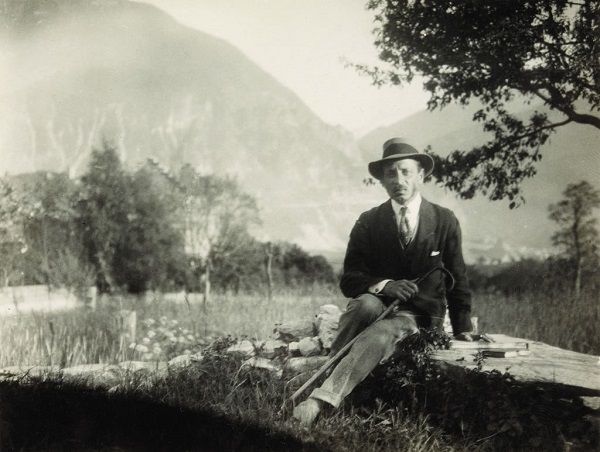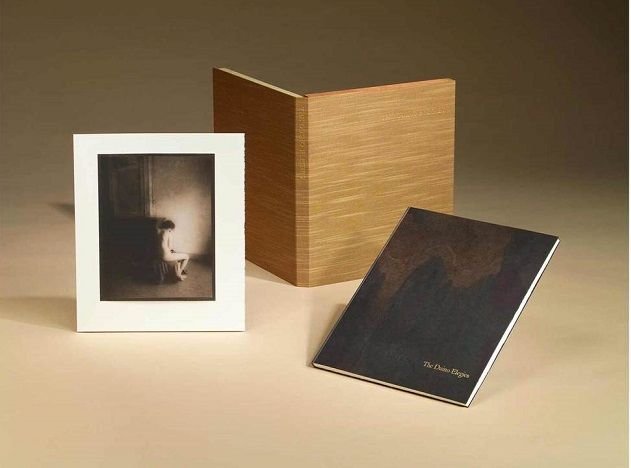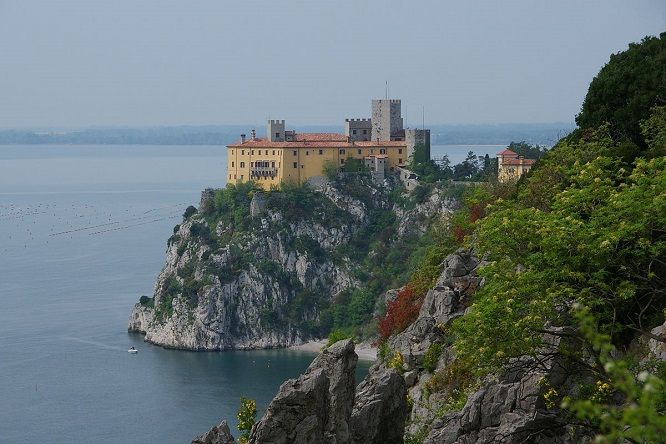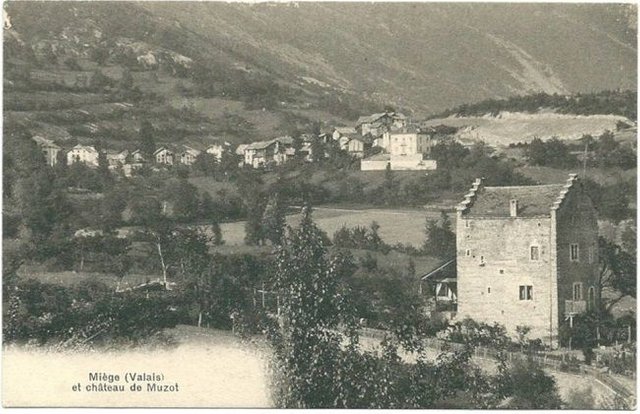Rainer Maria Rilke - Duino Elegies, to be someone else's dream

Duino is a small castle that has been hidden above the abyss, whose unseen bottom lies deep under the Adriatic's blue-eyed mirror. In its rocky outcrop, there is a naturally carved, mysterious stone figure, called La Dama Bianca. The castle is named after a border town, which is bilingual signposts in Italian and Slovenian. The lady is also the ruler of the home, in which the idea and the first verses of "Duino Elegies" were born a little more than a century ago - the famous decalogue of modern European poetry that marked the creative maturity of 20th Century lonely miniserie Rainer Maria Rilke. This lady is principessa Maria della Toree e Tasso, a benefactor and close friend of the poet, mistress of Castello di Duino at the beginning of 1912. Then, responding to the kind invitation to stay at the noble Mary Mansion, Rilke set the initial rhetorical question of the first elegia and fractal lines of the next eight that took him over the next decade, as a sign of gratitude to the generous Maria and her proudly possessed, in front of all ten, the adjective name Duineser, loyal to his early youthful tendency to offer gifts to the lair (Larenopfer).

Rainer Maria Rilke, The Duino Elegies
By specifying the genre of poems as elixirs, the author clearly declares his kinship with the first masters of European lyric, although the characteristic of the classical dwarf elliptical form of disthodon, consisting of alternation of a hexameter and pentamer, can change significantly under the pen of the German-language virtuoso and in some places sound in modern free verse. The poetic thought follows the special rhythm of the sea breeze by overflowing the queer of the first line of the distichon and seemingly ending with a point in the middle of its second order, beginning to rise again immediately after the punctuation mark. This excited breath of water builds up the body of the incomparable tenth-person - the monologue of the man before the angel, whose terrible beauty is able to interrupt the breath and destroy the sentence at all times, and if it does not, it is only because of indifference indifferent.
Doubt in the empathy of supernatural forces to the fate of the incarnate is a feature that is consistently distinguishing Rilke from his ancient ancestors. The messengers of the divine presence, these galleys of the universe, these evil birds of the soul, in the consciousness of the demanding man, the man longing for their attention, did not feed on his inviolability, nor even the disposers of his earthly gesture, but unmistakably powerful creatures, destroying his fragile, unintelligible being. Convinced of the overwhelming of this initial break, as well as in its abandonment of the arbitrariness of the elements, the lyrical Self attracts lovers, heroes, children, young dead as witnesses to the human discard "on the ridges of the heart". And she perceives the man's unique mission to be the bee of the immodest, which draws the essence from the earthly world, sucks it with all the forces of its awareness, and seals it in the vermicelli, to bring the visibility of every earthly moment into the molten old gold of memory / Erinnerung /, born of the inimitable play of human senses.

Duino Castle
The summoning of the superhuman forces, suddenly begun at the stone feet of the old Duino Castle, turns out to be a daring endeavor that will require the poet that has taken it all the wakefulness, will observe the most sincere aspirations will accompany the dream and the even- of a work in whose name life is deliberately sacrificed. At this place, where the Mediterranean stretches its salt Adriatic finger in heavenly color to touch the heart of the European continent, Rilke's mature poetic hearing, for the first time hears the absolute tone whose vibration will give direction to his return from all activities. After long periods of silent listening and painful discouragement, self-effacement of blood in a voluntarily imposed loneliness, an agonizing and unceasing drought of doubt in the human ability to hear the Lord's voice, the winter of 1922 turns out to be suddenly fertile, and the soul of the poet is flown by suddenly a raging hurricane of inspiration from which miraculously, at the same moment, the seventh, eighth and fifth elephies are blooming and bind in the same moment, while ninth and tenth, whose first rows are born in Duino, receive their completed buck. Along with the third one, started in Duino and completed in 1913, in Paris, with the fourth, written on 23.11.1915 in Munich, and with the sixth, drew the essence of Duino, the Andalusian Rhone and Paris, the whole tenth-round circle closes in the final its stop - the Swiss castle of Muzot, located in the valley of Renna. Mussot is an 18th-century building that looks more like a home-fortress, a simple Burg, on a tower in which the wandering singer of mystical, unobtrusive and irresistible love finally finds the centerpiece to swing its growing rings for which he wrote in your early revelation "Das Stundenbuch":
Ich lebe mein Leben in wachsenden Ringen,
die sich uber die Dinge ziehn.
Ich werde den letzten vielleicht nicht vollbringen,
aber versuchen will ich ihn.
Ich kreise um Gott, um den uralten Turm,
und ich kreise jahrtausendelang;
und ich wei? noch nicht: bin ich ein Falke, ein Sturm
oder ein gro?er Gesang.

Muzot, Switzerland
Armed with the centuries-old stone body of this tower, Rilke manages to emerge from the depths of his hesychia, calm down the silent water of his concentration, free his tongue in a spontaneous act of clergy, and turn the unalterable fragrance of solitude into unparalleled spell a ten-part sentence, revealing the unsuspecting riches of the Indo-European word treasury. Together with the Elegies, all the fifty-five "Sonnets of Orpheus"are spoken in one breath, whose blues, in the expression of the poet, spring from "the same ancestry" /Aus derselben Geburt/ with Duin's poems. As if divine twins, watchmen of the beatified integrity, they keep the memory of that sacred water then, irresponsibly taking away the faces and the awkward paths of the mirrors in her stars. Those who today have already unrecognized the heavenly image of giant chess-driven chess in the Rhone valley. "The Old Reine", named in his late letters to Lu Andreas-Salome, arrives in the evening on February 11, 1922, from the faithful Muzot, offering him the so-called shelter during the long-awaited supernatural vortex, and stroking him as a great animal-animal, a gesture of preoccupation in a nature that does not tolerate inanimation, and also a burst of casual gratitude for the shared overtones of trembling. Following this mockery of returning to himself, amazed by Rilke with the blessing of his dreamed deed, his body responded to the expectations of the spirit-dwelling-he retired tiredly in his shadowy possessions to make the prediction of the Ninth Elegy come true:
Erde, du liebe, ich will. Oh glaub, es bedurfte
nicht deiner Fruhlinge mehr, mich dir zu gewinnen –, einer,
ach, ein einziger ist schon dem Blute zu viel.
Namenlos bin ich zu dir entschlossen, von weit her.
Immer warst du im Recht, und dein heiliger Einfall
ist der vertrauliche Tod.
The thickening of poetry by virtue of its inexorable tragic balance leads to a blood disorder. The long-awaited dissolution and melting of the world in the heart - this natural attenuator of the sentient person - clarifies the blood and opens up a new room in the alchemical opus, called by Rilke "das Herzwerk" when the nigredo condition, a base for the perverted man alternated with the albedo (white creation), expressed in body white blood, leukemia, precipitation of the long-tempered image of the White Lady, Duin's visitor. The creative spirit does not interrupt the process of transformation to the very end - Ricke creates a legend of his suffering, according to which, by touching a rose once in the garden, he fingered his finger on a spike from her companion. The poet introduces the magical object of this fairytale created on the eve of the impending his / her dentist exasperation / das Weh-ende / and in his future epitaph:
Rose, oh, reiner Widerspruch, Lust,
Niemandes Schlaf zu sein unter
soviel Lidern.
I adore Rilke, many thanks, for this, @godflesh! As a poet and thinker, he is probably the single most important influence on my writing and a real source of spiritual sustenance that I return to regularly. Currently, I'm reading The Unknown Rilke [translated by Franz Wright]
These wise words of Rilke's sum up my life philosophy and raison d'etre:
“we are continually overflowing toward those who preceded us, toward our origin, and toward those who seemingly come after us. ... It is our task to imprint this temporary, perishable earth into ourselves so deeply, so painfully and passionately, that its essence can rise again “invisibly,” inside us. We are the bees of the invisible. We wildly collect the honey of the visible, to store it in the great golden hive of the invisible.”
Also, if you/readers are interested, below is a kind of love letter to Rilke (as well as Nietzsche): http://www.bu.edu/agni/interviews/print/2011/lababidi-stein.html
Keep up the excellent work, you're like a one-person library on Steemit!
Cheers, Yahia
@yahialababidi , thank you for this wonderful quote, this is exactly what I'm just paraphrase in some part's of my post.
I will see this book by Franz Wright. Now I am reading the letters of Tsvetaeva and Rilke. I've been looking for them for so long.
Yes, I felt it in the lyrical density of your prose.
Enjoy Letters; his correspondence with Salome (if you’ve not already seen it) is worth knowing too.
Yes I will read them. Cheers! :)
Thanks for that reminder to look again at Rilke's great work. Ein gesundes neues Jahr!
Danke! :)
I wish you all the best!
Great informations thanks
No problem :)
Nice post keep posting
Happy new year
Thank you :)